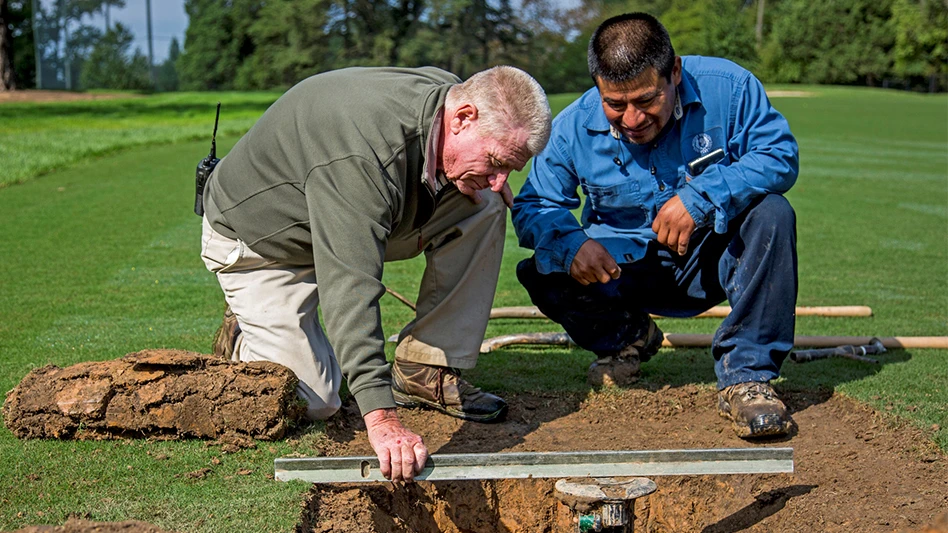On-the-fly learning and on-the-job training are unwritten required skills for today’s time-stressed and understaffed superintendents, golf professionals and club managers.
Some leaders are more comfortable than others with OTF and OTJ learning. They easily adapt and roll with the punches, energized by the challenge of learning while doing and training in real time. Others are flummoxed by the frustration, ambiguity and the unpredictability of an unstructured process.
Regardless of your comfort level, it’s important to both job security and growth to improve as an OTF and OTJ learner. We say that with confidence because we see nothing that will reverse the forces limiting the time and budget available to develop managers and their staff. So how do you improve as an OTF and OTJ learner?
Understanding the skills and personality traits that make one a spontaneous learner is a starting point. If you are a relentless learner, one who pursues new information and learns quickly from encounters with new problems and mistakes, you’re probably already pretty comfortable with OTF learning. Similarly, if you enjoy the challenge of unfamiliar tasks and clearly see the underlying structure in systems and processes, you’re probably an effective OTF learner.
According to Candace Narie Thille, an assistant professor of education at Stanford University, these characteristics make you comfortable with spontaneous or experience-driven lessons called “adaptive learning.” Most jobs at golf courses and clubs are a matter of constant adaptation, so learning follows in due course in many circumstances.
Managers and superintendents willing to experiment with various options to reach a solution are natural adaptive learners. In some cases, these agile thinkers will leave others behind and confused as they inject new twists in order to find a solution to an aspect of the problem slightly different than the one they were first addressing.
Those who are not comfortable learning on the fly may not analyze problems carefully or search for multiple clues and parallels because they don’t want to risk being wrong, especially in front of other managers or their staff. For them, the comfort of historical and proven methods is less threatening than the ambiguity of the unknown.
HR professionals observe that managers unskilled in learning on the fly are described as:
- Doesn’t look under rocks
- Just sticks to the obvious
- Looks for the simplest explanation too soon
- Functions on the surface
- Gives up too soon.
The best way to become and remain an adaptive learner is to push for continuous improvement by seeking new information and knowledge. Effective methods for self-teaching to become more proficient at adaptive learning include problem- and puzzle-solving; breaking down new technologies or services to understand how they function and how they could be adapted to other disciplines; and observing new or different businesses or technologies to understand how they work and whether they are adaptable to one’s own field or professional discipline.
Zach Posner, managing director of the learning science platforms at McGraw-Hill Education, said he sees adaptive learning as an alternative for one-on-one coaching. “It’s a scalable way to personalize the learning experience,” he told Chief Learning Officer magazine. Normally corporate training is a one-size-fits-all proposition, so finding ways to personalize what you learn – and teach – is a more effective learning option.
To be sure, some things are best learned from the book. The science behind effective agronomic practices, chemical formulations and accounting principles, for example, are not the best candidates for OTF learning.
But in the world of course and club management, where time and resources are limited, there is so much that is best learned at the feet and at the side of those who have spent years in the business. They probably won’t hand you a manual with 10 easy steps to mastering the task at hand. But if you pay attention and open yourself up to learning on the fly, you just might find new career opportunities.

Explore the November 2017 Issue
Check out more from this issue and find your next story to read.
Latest from Golf Course Industry
- KemperSports and Touchstone Golf announce partnership
- PBI-Gordon Company hires marketing manager Jared Hoyle
- Mountain Sky Guest Ranch announces bunker enhancement project
- GCSAA names Joshua Tapp director of environmental programs
- AQUA-AID Solutions bolsters Sunshine State presence
- Escalante Golf acquires secluded Illinois course
- Tartan Talks 105: Nathan Crace and Todd Quitno
- Disease Discussion 24: Let the turf talk to you





